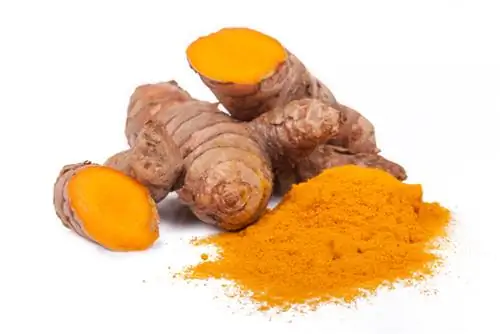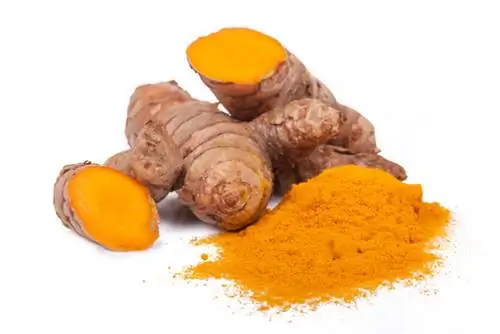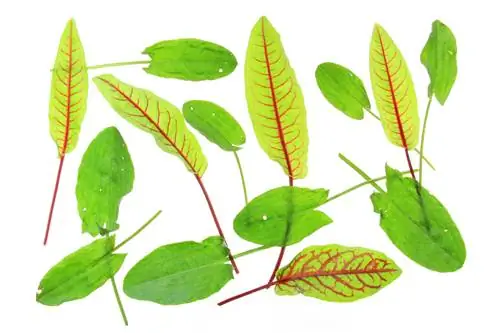- Author admin [email protected].
- Public 2023-12-16 16:46.
- Last modified 2025-01-23 11:20.
Indians and Asians have revered turmeric as a sacred plant for over 5,000 years. The rhizome from the ginger family is also known as turmeric. Traditional Chinese medicine and Ayurveda have long used the unique medicinal properties of the spice. Now the anti-inflammatory, pain-relieving, antioxidant and detoxifying ingredient curcumin is finding its way into natural medicine in Europe.

What are the he alth benefits of turmeric?
Turmeric is a sacred plant with anti-inflammatory, analgesic and antioxidant properties. It can help with diseases such as Alzheimer's, diabetes, arthritis and cancer. For maximum bioavailability, turmeric should be heated with pepper and oil.
The effectiveness of the valuable ingredients
Curcumin is considered a flavoring agent, coloring agent and food additive E100. Much more interesting, however, are the positive effects on diseases such as Alzheimer's and diabetes. Turmeric prevents bone loss and lowers cholesterol levels. Other ingredients include ferulic acid, polysaccharides and starch.
The caffeic acid contained with its derivatives protects the stomach. It prevents carcinogenic and toxic nitrosamines from forming. Five to seven percent of turmeric consists of essential oils, which have proven to be very successful in defending against microorganisms and tumor cells. They counteract arthritis and rheumatism. Its bioavailability can be increased when turmeric is heated in conjunction with oil and pepper.
In more than 3,000 studies on all types of cancer, a promising effect of turmeric on tumors of the intestine, skin, breast, lung, prostate and cervix has been proven. This shows that the spice and medicinal plant
- stimulates the immune system
- prevents the development of cancer cells
- inhibits the division of degenerate cells
- limits the spread of metastases
- Stops the invasion of tumor tissue into blood vessels
- which supports radiation or chemotherapy
- the genetic system activated.
The importance of turmeric in Alzheimer's disease
Since many of the expensive medications have numerous side effects, interest in natural methods to alleviate the symptoms is increasing. In countries where turmeric is used as a traditional spice, there are no cases of Alzheimer's disease.
As far as is known medically, dementia leads to the deposition of so-called plaques, which lead to inflammation in the brain and increasingly impair organ function. Curcumin's antioxidant abilities prevent plaque formation. There is evidence that the substance is able to cross the blood-brain barrier.
As an American study shows, taking one gram of curcumin daily increases memory performance in dementia and improves the symptoms of Alzheimer's disease. After three months of administering the natural remedy, initial success was measurable.
Conclusion
Turmeric is a valuable product that stimulates metabolism. The rhizome is dried and powdered for seasoning. In case of illness, curcumin should be administered in capsule form. The treatment has no side effects. In individual cases, hypersensitivity such as nausea is possible. Pregnant and breastfeeding women should definitely avoid taking it!
Frequently asked questions about turmeric
These questions are often asked in connection with turmeric.
Turmeric & Teeth
- Why does turmeric whiten teeth?
- Does turmeric stain your teeth?
- Does turmeric turn your teeth yellow?
- Turmeric for whiter teeth?
Turmeric & Skin
- Turmeric for the skin?
- Turmeric on your hands?
- Does turmeric color the skin?
- Turmeric for acne?
- Turmeric for wrinkles?
- Turmeric for dark circles under the eyes?
The use of turmeric
- How to use turmeric?
- How to use turmeric?
- Eat turmeric with peel?
- What effect does turmeric have?
- How long should I take turmeric?
- What does turmeric do with pepper?
- Turmeric like cortisone?
- How to take turmeric powder?
- Turmeric how much?
- How often do you take turmeric?
- Turmeric on an empty stomach?
- Turmeric with pepper
- Turmeric with milk
- Turmeric with honey
- Turmeric with piperine
- Turmeric with water
- Turmeric with oil
- Turmeric with yogurt
- Turmeric with ginger
- Turmeric with olive oil
- Turmeric with lemon
- Turmeric with coconut oil and pepper
Turmeric as a spice
- Turmeric with which dishes?
- Turmeric what spice?
- Turmeric for which dishes?
The effects of turmeric
- Turmeric for he alth?
- What does turmeric do in the body?
- The effect of turmeric?
Turmeric against diseases
- Turmeric on wounds?
- Why is turmeric so he althy?
- Turmeric for the liver?
- Turmeric for heartburn?
- Turmeric for cystitis?
- Why is turmeric he althy?
- Turmeric against cancer?
- Turmeric for depression?
- Turmeric for a cold?
- Turmeric for anxiety?
- Turmeric for osteoarthritis?
- Turmeric for pain?
- Turmeric for MS?
- Turmeric for rheumatism?
- Turmeric for high blood pressure?
- Turmeric for psoriasis?
- Turmeric for headaches?
- Turmeric for diabetes?
- Turmeric for psoriasis?
- Turmeric for histamine intolerance?
- Turmeric for cough?
- Turmeric without gallbladder?
- Turmeric for heartburn?
- Turmeric for high blood pressure?
- Turmeric for joint pain?
- Turmeric for gastritis?
- Turmeric for cystitis?
- Turmeric for diarrhea?
- Turmeric for joint pain?
- Turmeric for allergy?
- Turmeric for stomach problems?
- Turmeric for flu?
- Turmeric after stroke?
- Turmeric for flatulence?
- Turmeric for gout?
- Turmeric for hair?
Other
- Turmeric for children?
- Alternative to turmeric?
- Where does turmeric grow?
- Turmeric for horses?
- Turmeric for cats?
- Turmeric for dogs?
- Which turmeric is the best?
- Where is turmeric grown?






